This is the third post in my series of Running free… A developers story of development.. Here I will speak about my surroundings in German society and in a German company and why I overworked nevertheless and what I learned from my behaviour and mistakes therein.
This piece has been written before the #COVID-19 crisis. Speaking about a safety net feels so much weirder now and the need for one became so much more obvious.
Why do we overwork?
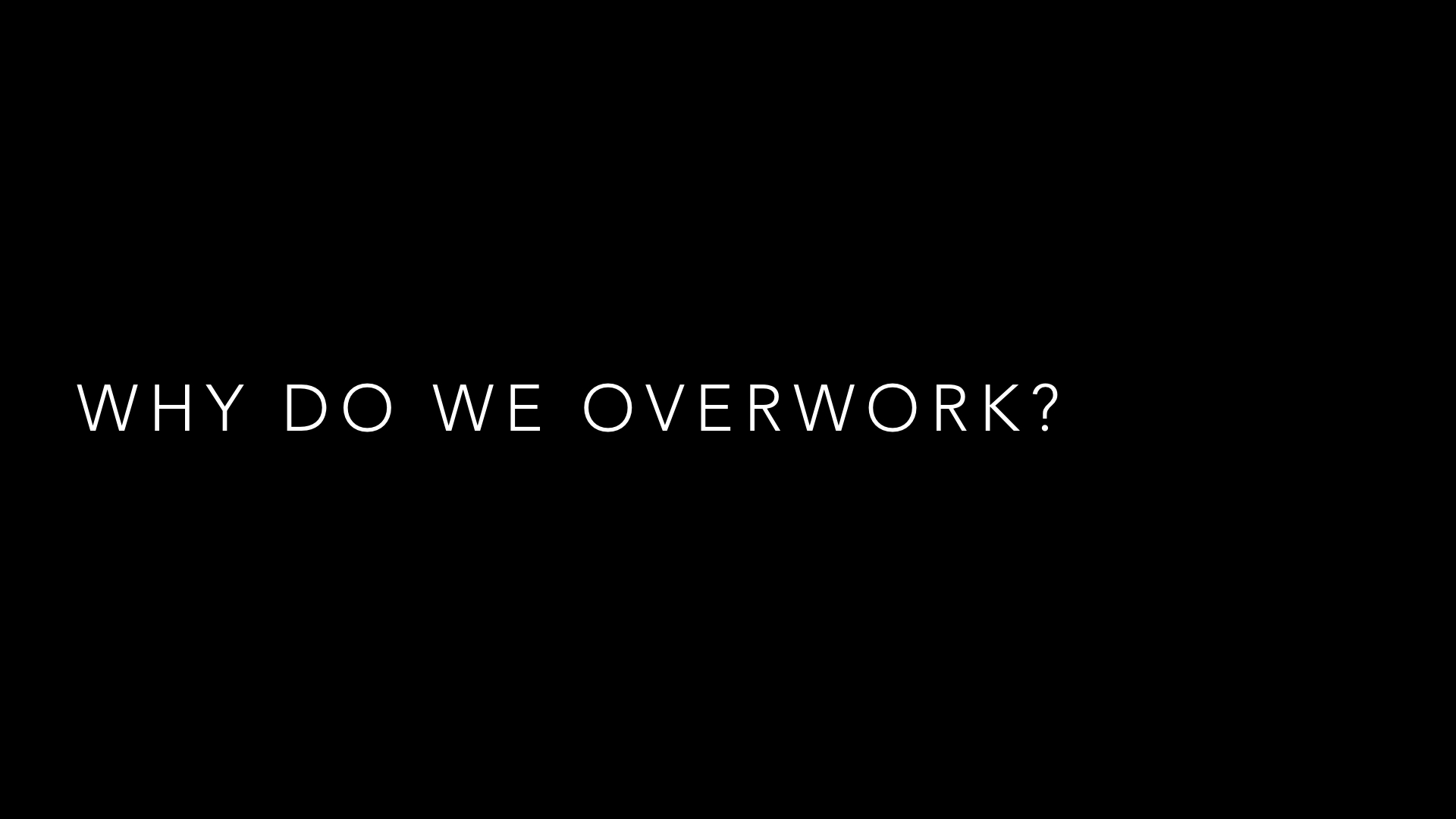
I will describe the surroundings and conditions you’ll find these days in Germany regarding work. Why? Because it is important to understand that self inflicted overwork is not necessary all the times. Technically, it is not necessary.
The question “Why do we overwork?” has been raised by a lot of people and also addressed by a lot.
I found one interesting paper by Lonnie Golden and Morris Altman: “Why Do People Overwork? Over-Supply of Hours of Labor, Labor Market Forces and Adaptive Preferences”
That paper of course addresses both externally and intrinsic imposed work hours and overemployment. The authors are experts on that field and you should probably trust their input more than mine.
Let’s stick with the authors definition of overwork as work beyond a persons own capacity that is self-sustainable in terms of physical or mental well-being and overemployment as work beyond their initially preferred or agreed extend of commitment toward working hours.
Overwork refers specifically to the cumulative consequences of operating at overcapacity, additional hours spent at work eventually creates fatigue or stress so that the worker’s physical or mental health, well-being health or quality of life is not sustainable in the longer run.
–Lonnie Golden and Morris Altman, Why Do People Overwork
Keep in Mind: Wage vs Salary
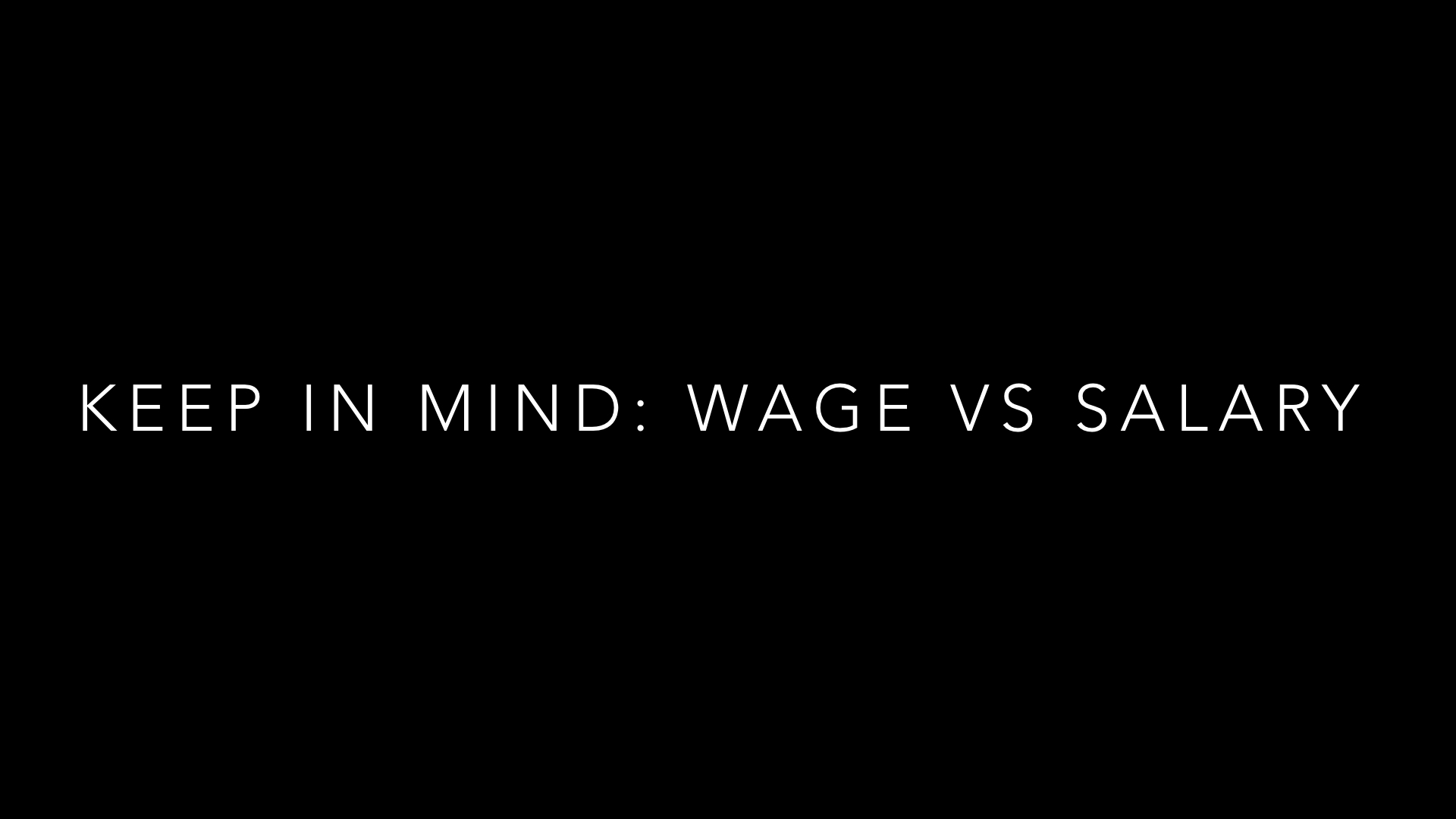
A couple of things said in the current slides will not apply for everyone. Freelancers and contractors usually have agreed wages per hour and are potentially in a better position to control their number of working hours. Or at least: Each working hour of a person with a wage based income will result in a higher income. For people with a fixed salary this is of course seldom true.
I’m unfamiliar with the situation outside Germany, but in my country we find various scenarios. At times over hours are included in the salary. Sometimes only a fixed number is included, the other ones are payable at a given amount. Or the over hours can be redeemed as off hours and days.
But the important thing to keep in mind here is: The fact that one has a directly related, positive feedback to over hours (aka more money) respectively is in control about the number of hours, reduces the perceived feeling of being overworked.
This doesn’t however change the adverse effects of being overwork on
- Personal well being
- Family and social life
- Risks of accidents
for example.
Directly imposed work hours and overemployment
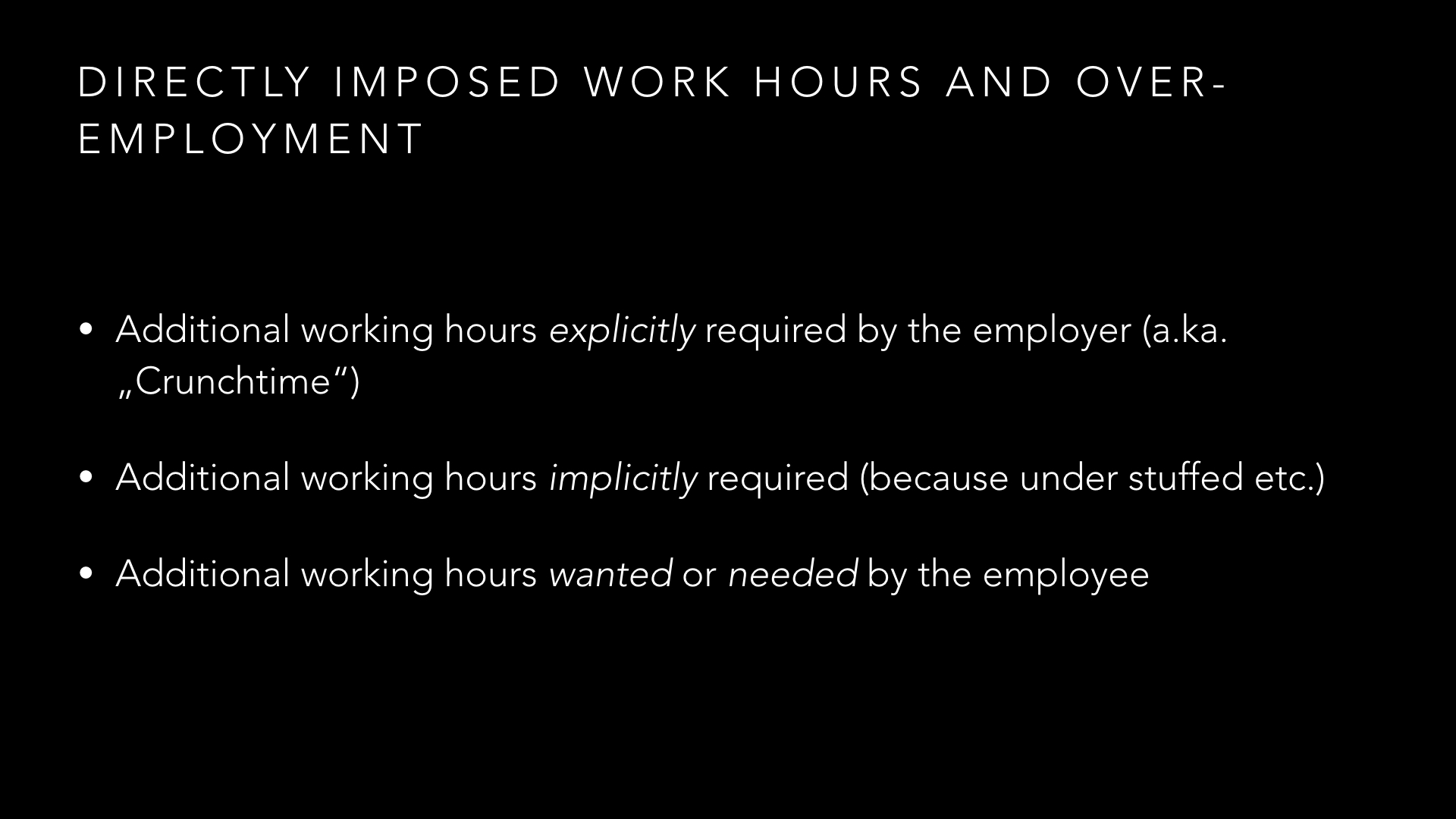
Here are a couple of things that directly come to mind when thinking about over hours. Over hours can be explicitly or implicitly requested by the employer. In our industry that often happens at the end of a “final” sprint, before a release (well, shouldn’t those big bang release be gone with microservices and all that anyway?) or as the infamous crunch time.
Implicit over hours are more subtle. Their reasons vary from a project being under stuffed, people being constantly distracted from work and trying to keep up etc. One reason might be even old and sluggish hardware, shops giving old laptops with spinning disk drives out to people just to cut costs.
I tend to be ok with the occasional explicitly demanded hour. On the one hand I get paid well but on the other hand, I always had an interested in the success of the companies I worked for. If I wouldn’t have that, I couldn’t work to my full potential.
The last point on this slide is an issue of course: A lot of people involuntary do over hours and over employment and still don’t make ends meet. Probably that’s not such a big issue in a well paying industry like hours in a western society, but it’s a general problem.
At least in Germany, a couple of things mediate the later issue and I’m gonna briefly speak about them so that you get an idea about the safety net that helps you when making job wise decisions and planning in Germany. Why do I think this is important? Because it gives you freedom and room for decisions.
Safety net in Germany
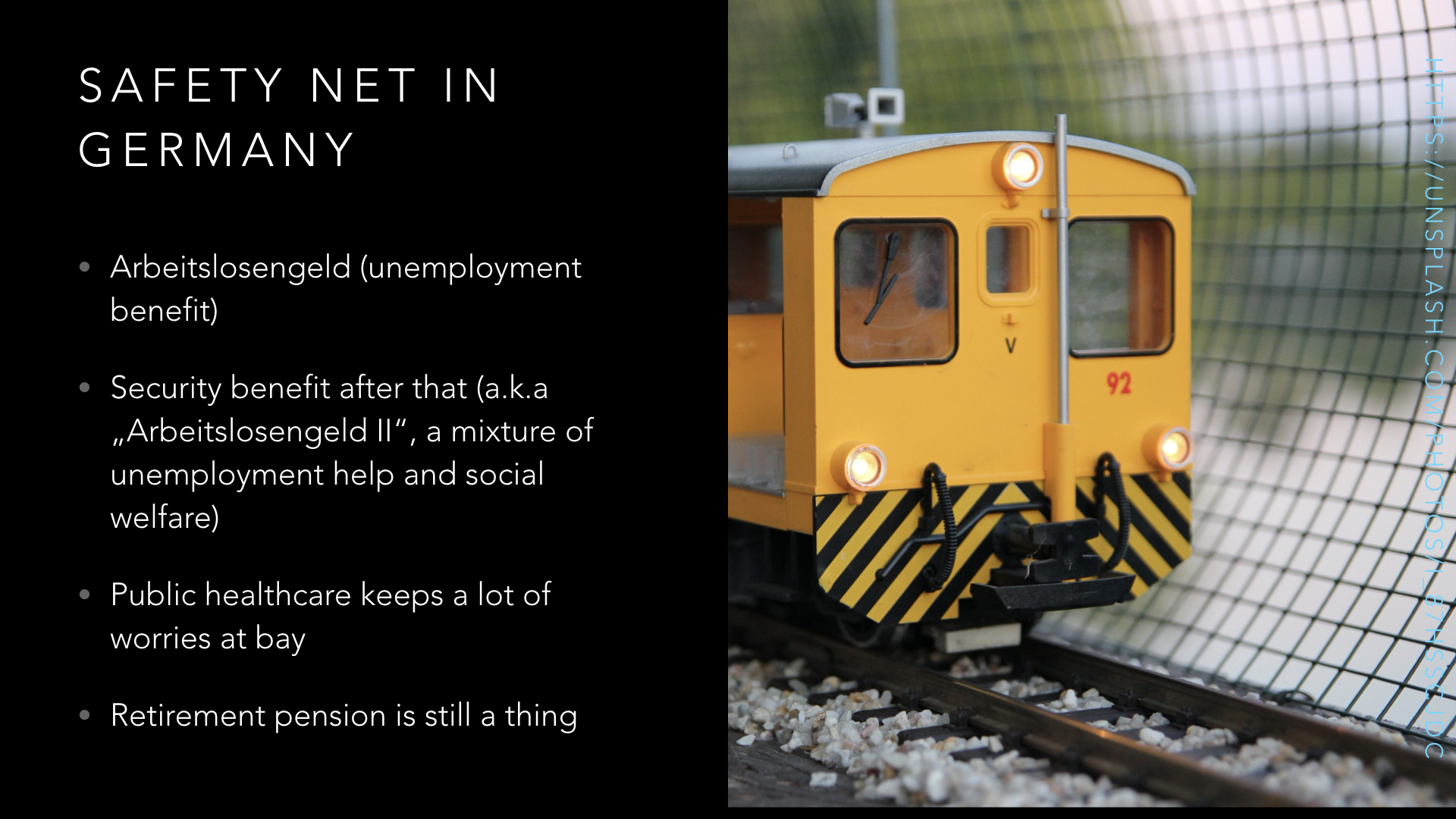
Many people think of safety nets in cases of falling down… I like that image here a lot as well: Falling down starts by getting of the rails and a good safety net prevents this.
So, what do we have in Germany that helps keeping you on the track, giving you time finding new jobs and actually taking care of yourself and your family?
So first of all, we have Arbeitslosengeld which means unemployment benefit. This is paid for at least 6 months when you had been employed for 12 months. It is paid for 12 months when you had been employed for more than 24 months before being unemployed. There is a penalty of 2 months when you quit compared to when you had been given notice.
The gross amount of Arbeitslosengeld is 67% of your previous average income over a given period (until a maximum value). Most people won’t be able to keep their living standard on the amount, but it gives you a long enough period looking for a new job without worrying all to much, at least in our industry and filter bubble.
After the period of unemployment benefit people can claim Arbeitslosengeld II or Hartz IV. The things here a lot more complicated and the actual amount one receive is much lower. The law was an attempt to bring together social welfare and unemployment help. Arbeitslosengeld II comes with strings attached, people are obliged to improve their job situation, take offered jobs or they will sanctions.
A thing that keeps a lot of worries at bay is of course public healthcare. I don’t have to worry to call an ambulance, I don’t need to pay bills upfront. Most of the time this works pretty decent.
Last but not least: Most people here rely on state retirement pension. Private investing huge amount of income is still quite uncommon in Germany. There have been a lot of attempts to change that, but I’m sceptic here and I am unsure how that will work out. Most people here don’t plan on retire like before 40 or something, but work until eligible to receive a pension.
Family

One important aspect is the fact that Germany tries to protect families and encourages both parents to do both: family work and income related work. That could be better to large extend – at least compared to the Scandinavian area – but we’re not that bad.
What do we have in place? From the day of the pregnancy being announced at work until 4 months after birth mothers cannot be dismissed by law. Then there is maternity protection, which basically prohibits forcing a mother to work 6 weeks before birth and 8 weeks after birth.
For the longer term aspect of work versus family, the aspect of general parental leave protection is more important. Parents are protected by law against dismissal and similar when they go on parental leave, up-to 36 months per kid and parent. And that’s not all: For a maximum period of 14 month, there’s Elterngeld, which is at max 65% of the parents net income.
Why am I stating this here? While there different circumstances that makes things harder, but there shouldn’t be a reason why one parent – usually the dad – runs back to work asap. It’s definitely not a project that’s more important than a kid and often not the money.
So again, why?

Assuming we have don’t are continually required to do over time by our bosses, don’t need to work around the clock to compensate other issues of the company and can make ends meet without living in constant fear of losing a job:
Why do we over work?
Possible reasons for self inflicted over working
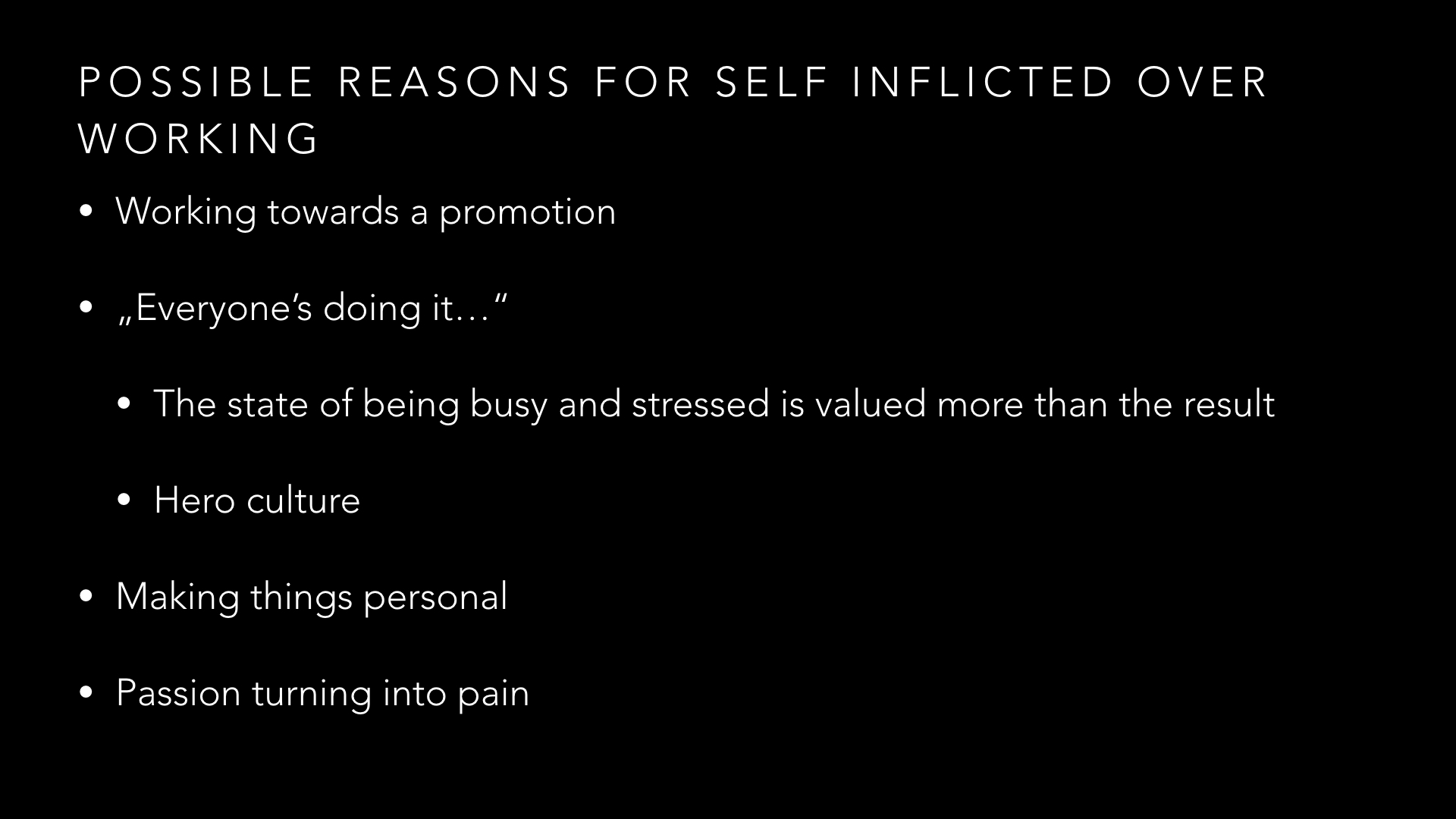
I came up with a number of possible reasons, and most of them are my own.
There are some pretty solid reasons… Working for a promotion, doing some experiments, maybe spiking something. A less valid reason is because everyone is doing it due to management seeing the busy people as more productive or a Hero culture where always someone really knowledgeable comes in and saves the day (on the price for them to burn out).
Some people forget what we had a couple of pages ago: We are not our code. And we are not our work. We don’t need to take everything personal and grind us to pieces on fixing something. I hear my colleague laughing over there in Brunswick. I’m in need for constant reminder not taking every bug personally.
And of course, there’s alway the thin line between being passionate for something and suffering for something. The origin of the word passion is exactly that: Pain.
I’m deliberately not saying that these reasons are from my past, I’m just the type of person prone to let passion go into pain.
A stoic, caring approach would help here.
Why do we I overwork?
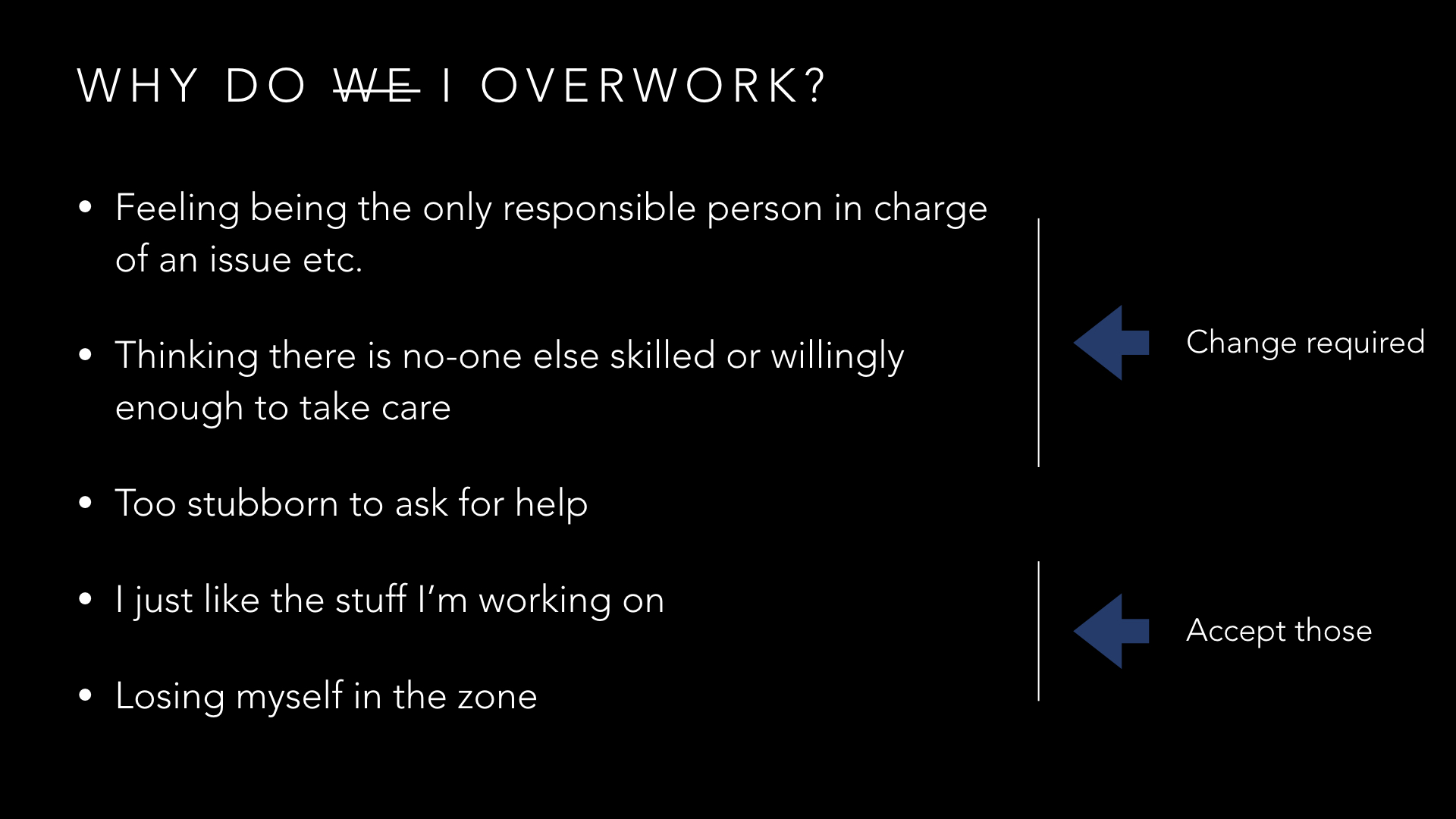
Now, let’s jump into my personal reasons and the issues I’m constantly facing and make an “I” out of this we.
I feel responsible, whether it’s just perceived or for real. That feeling is stronger the less I feel there’s someone else jumping in or skilled enough to solve it.
That leads me to thinking there is no-one skilled or willingly enough to take care of an issue.
When faced with problems I’m trying to solve, I’m quite often too stubborn to ask for help, which of course is being myself implementing my own hero culture.
Apart from that, I just like the stuff I’m working on and I’m somewhat a perfectionist. Together, that’s an easy way to just loose myself in the zone and completely forgetting about time and my surroundings.
For me it was important to realize the items here that needed to be addressed for me to feel better.
Things I can change
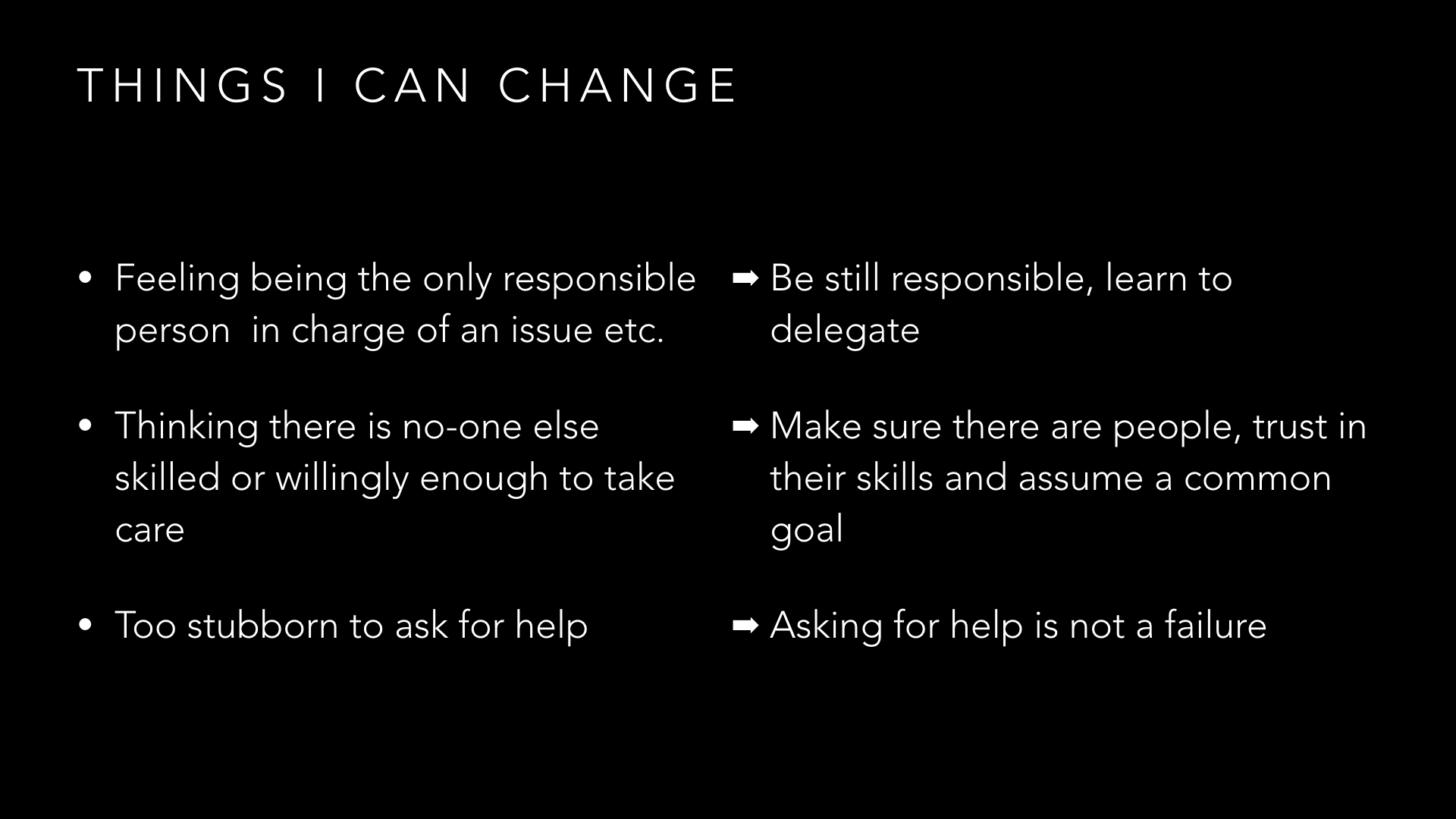
So of course the feeling of being responsible is not a bad feeling. It’s quite important, it’s a sign that you care.
But remember, being responsible and doing everything on your own are not the same, so learn to delegate.
The assumption there is no-one to delegate to or no-one else skilled enough for a problem or not willing to solve it, is just wrong. Of course, if you’re working completely in isolation, that is the case, but that seems quite rare. So, make sure there other people, trust them and trust into their skills and assume a common goal.
If you are not working directly together and are in sort of customer / supplier relationship, try seeing an issue from their perspective. They want an issue solved as much as you do, but maybe they just don’t have the knowledge to do so.
The third bullet point should be perfectly clear: Just don’t be stubborn, asking for help is NOT a failure.
Flashback
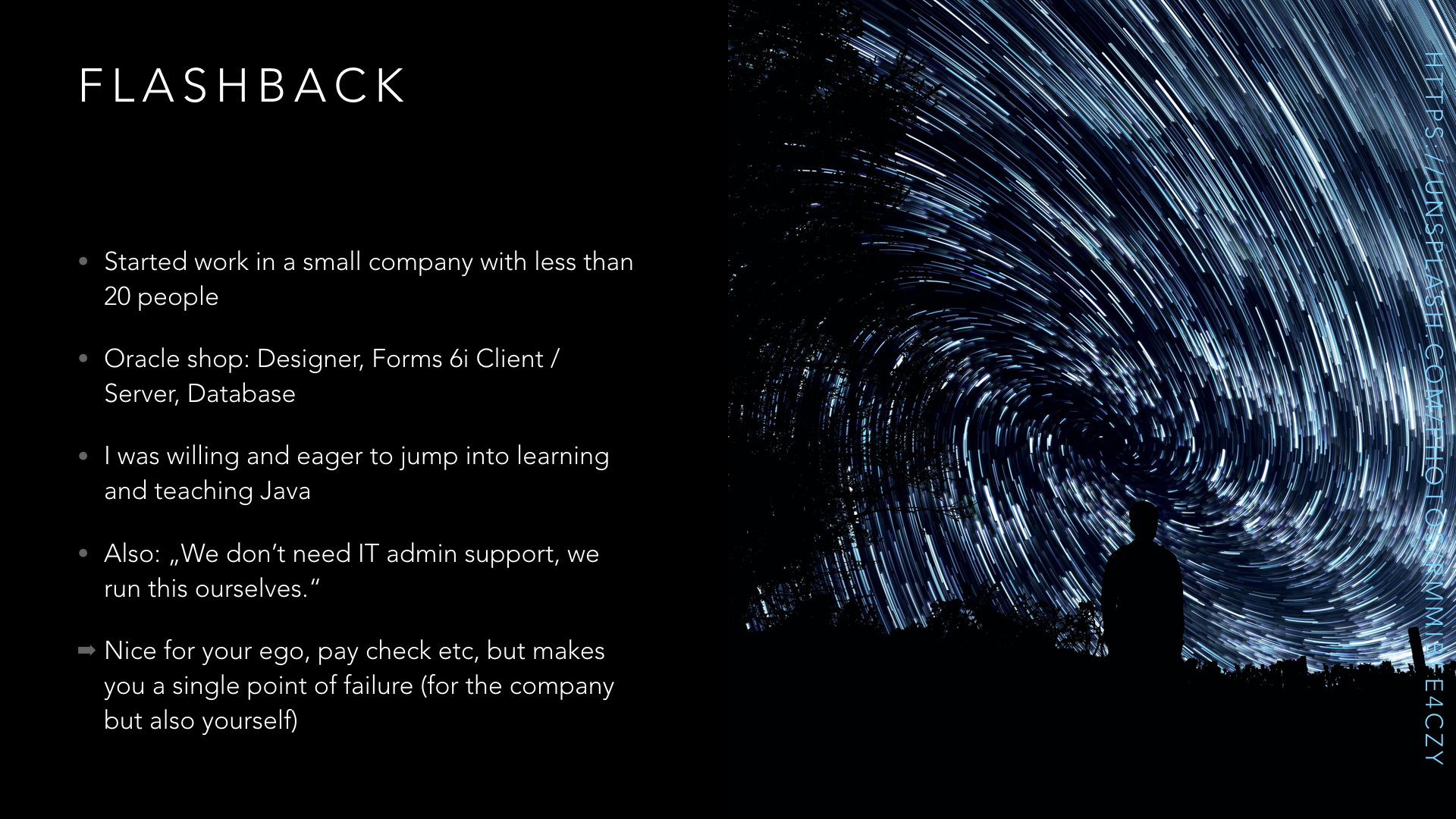
After studies I started my career in a small company with less than 20 people, including 2 CEOs and a cleaner. I entered at a time when Oracle Forms Client server was the given tool in that company.
While the company was an Oracle shop – from Database to Forms to Designer and back – times where changing, Forms Client Server was about to be deprecated and I was really lucky that the CEO was very open to new things and always supported us with research and development without an immediate monetizable effect.
A bit fast forward 2 or 3 years, I found myself in a couple of Java courses and learning Java SE (Swing) as well as having a peek into web applications with J2EE (this is not a mistake, Jakarta EE was called that way back then). We didn’t go the Jakarta EE route, but landed in Spring and Oracle APEX world, but that’s story in its own right
Unrelated to the tech stack: Many of those small shops ran their own infrastructure back then, but without a supportive IT department and just doing things on the fly. Remember, that was pre cloud era and one used to host all things yourself. Guess who felt responsible in the end?
The result: I somewhat aggregated all the Java (and later) Spring knowledge in the company and later on, most of the administrative IT things.
That is nice for your ego, hopefully good for your paycheck and is fun to a certain point and amount of work, but eventually, you’ll be a single point of failure, for the company but also for what you can actually manage to achieve.
Lessons learned
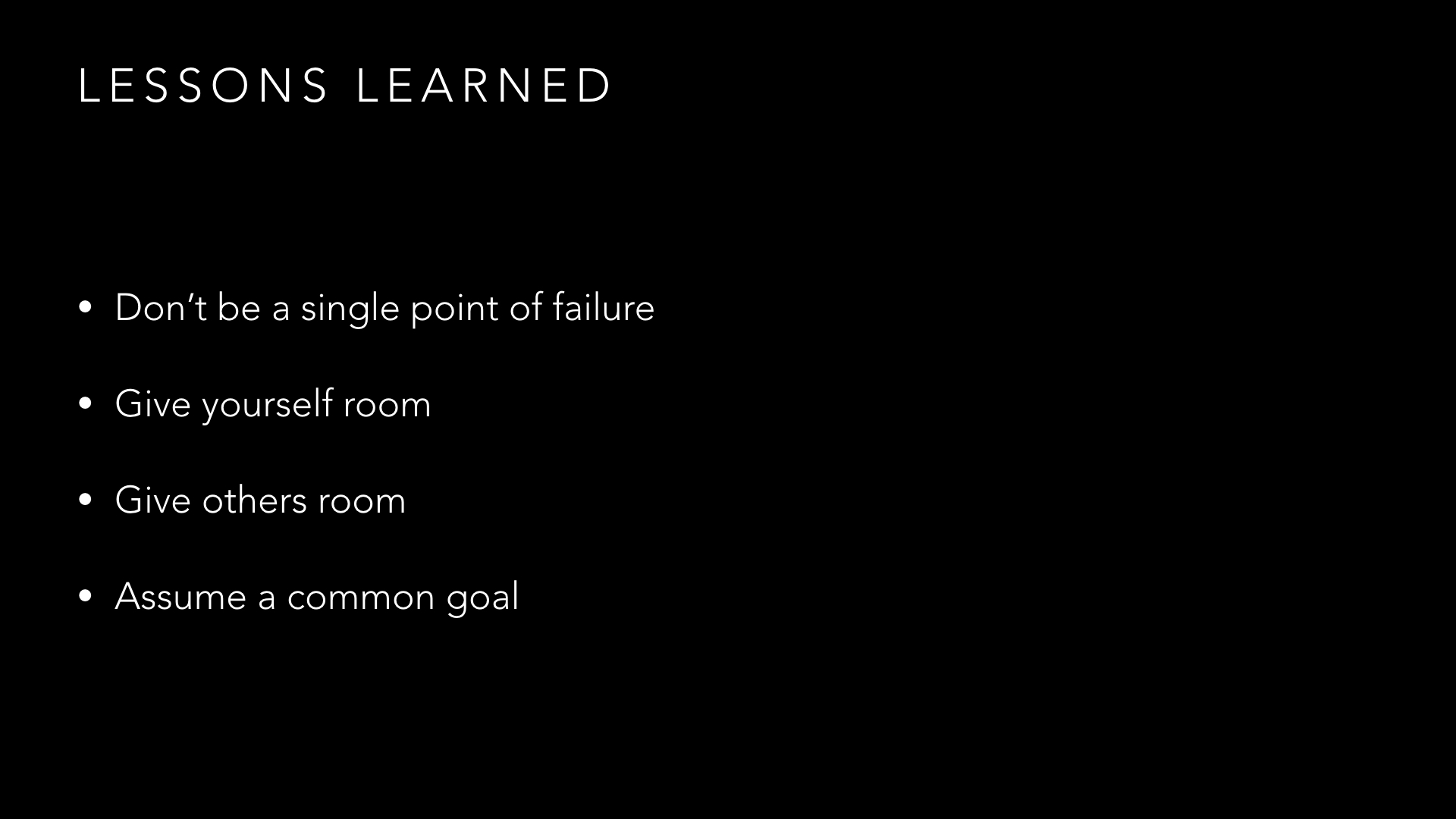
A system having a single point of failure is not resilient. The single point of failure is under too much pressure.
Don’t be that single point of failure!
It is not enough to accumulate all the knowledge to grow. Growth needs room. There is no room when you’re the single point of failure.
The same is true for everyone around you: When you walk around with an ego bigger than your head, nobody else can grow, make their own mistakes and learn as you did. Good people will either leave or end up being frustrated.
When you work together, assume a common goal. Of course there’s always personal interest involved, but that is inevitable. Would working together without trust in common goals be reasonable at all?
The Things I won’t change
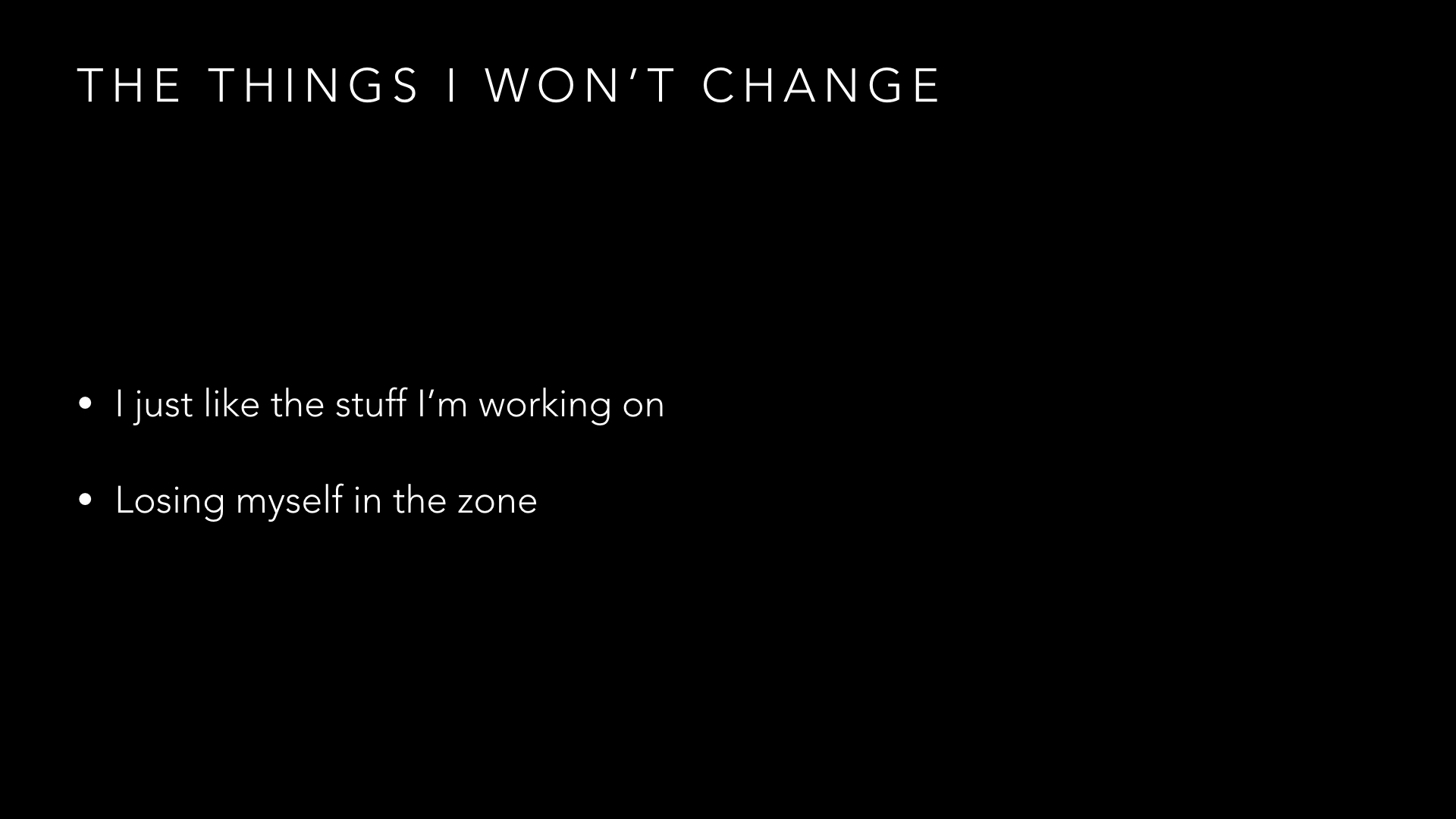
I still like the stuff I work on, even more these days. Also, losing oneself in an immersive task is just great.
To care about something and do it with 100% is both a strength and a flaw when overdone. It allows you to be good at something but also can burn away all your strength.
It’s all about the dosage and avoiding the pain of too much passion:
Passion needs fuel to burn

There is a fantastic blog titled Passion and burnout from Codecentrics Nandor Gyerman. Nandor starts with the suffering aspect as well and takes it a step further: Passion is an intense feeling of fire, an act of self-immolation.
The fire needs fuel to burn. That fire can be sustainable or not, depending on what you burn on the altar of passion: Time, energy, common sense, money, habits, sleep or finally sanity?
Enjoy stoic virtue more than uncontrollable passion

My approach here is – and by any measurement, i still fail on this quite often – to enjoy things I do with a stoic virtue more than a burning passion that eventually will devour me.
Care about things, but don’t forget to care about yourself. Otherwise passion will eventually burn you out.
Remember the key thing about life on earth is change.

“What about your previous shop?”
By the end of 2014 I was a general manager (“Prokurist” to be precise), and it turned out: It just wasn’t my role. There are lot of important takeaways:
- Making someone a manager just by order doesn’t work, it needs preparation
- Being a manager on the other hand requires effort and work and doesn’t work – like software development – out of the box
- If you not intrinsic motivated, things don’t work out
I found myself in a constant overload: Still trying to be a good developer and at the same time struggling to be a manager. I learned the hard way that authority given by order is worth nothing, it doesn’t work that way.
Even when a role changes significantly by outer mechanism, your position in the company between colleagues won’t do with the same momentum.
So in 2017 we parted ways and it was good to do so.
I could try out a couple of things afterwards and I wasn’t too afraid to change anymore
My old boss and I still speak regularly and I’m happy. They are doing as good as I am. I can see first hand, how things change for the better, when there is enough room for everyone.
One thing I took with me from those years: Having a mentor at a company, who trusts in you and supports you is invaluable. It opens doors to opportunities, learning and so much more.
If you happen to look for something new, this would be one aspect that would be important for me.
Continue with the forth and final part: More lessons learned.






No comments yet
Post a Comment